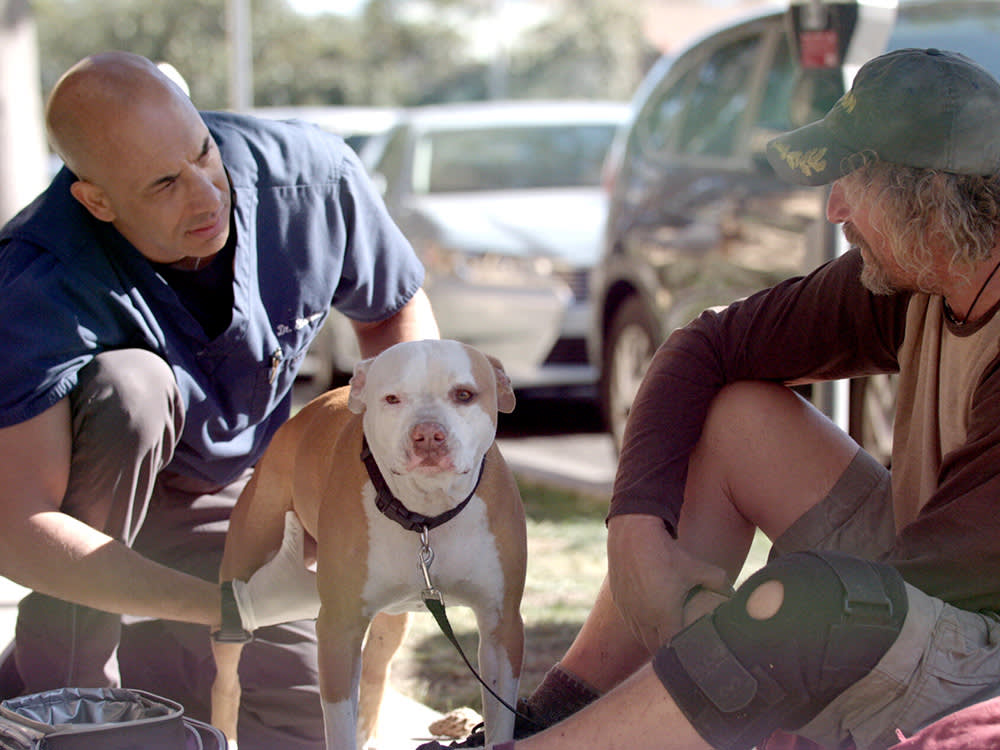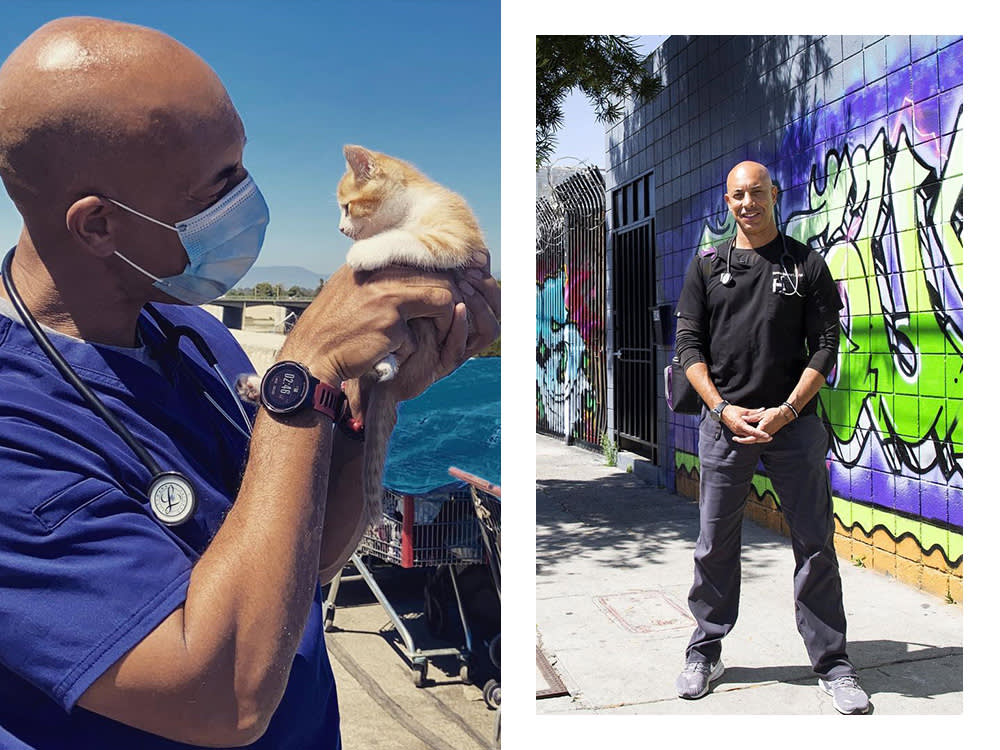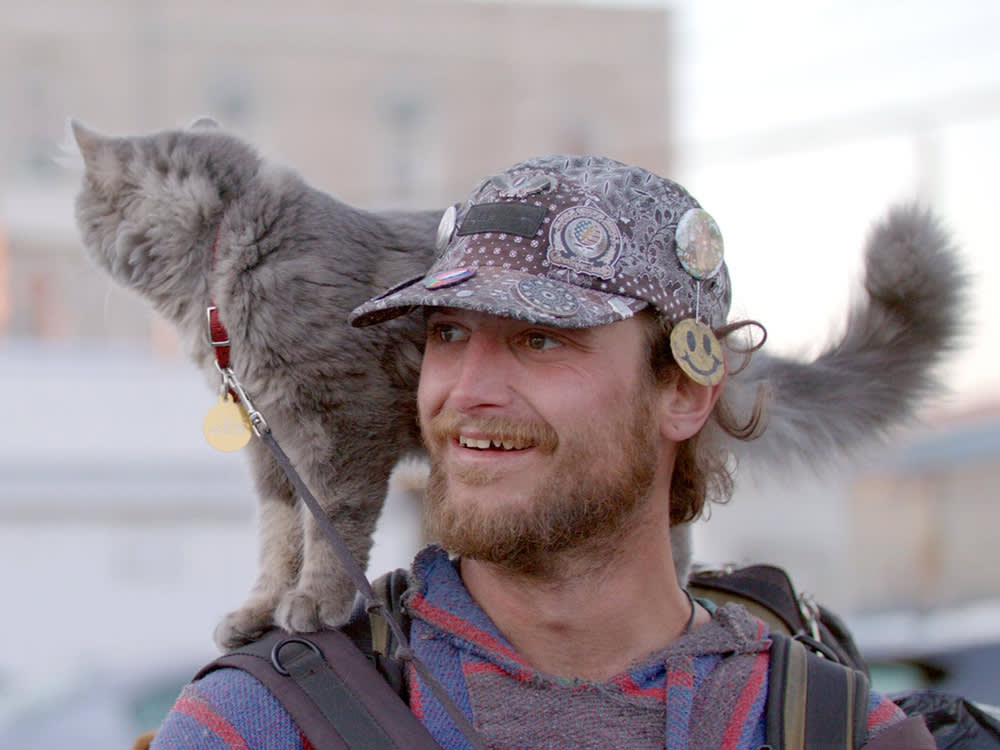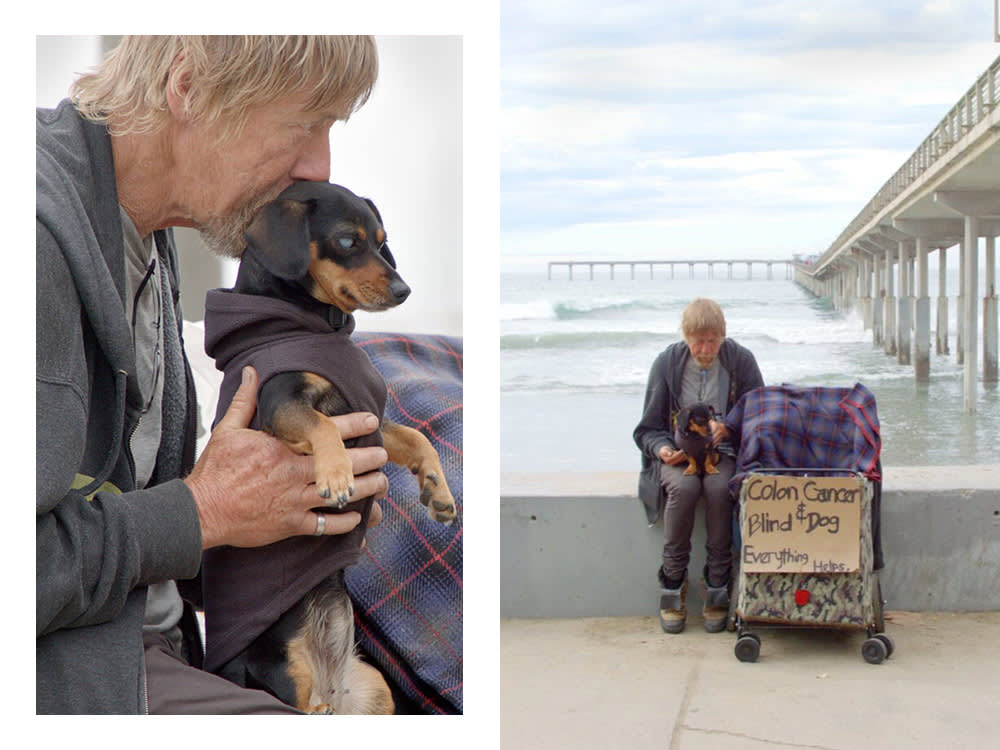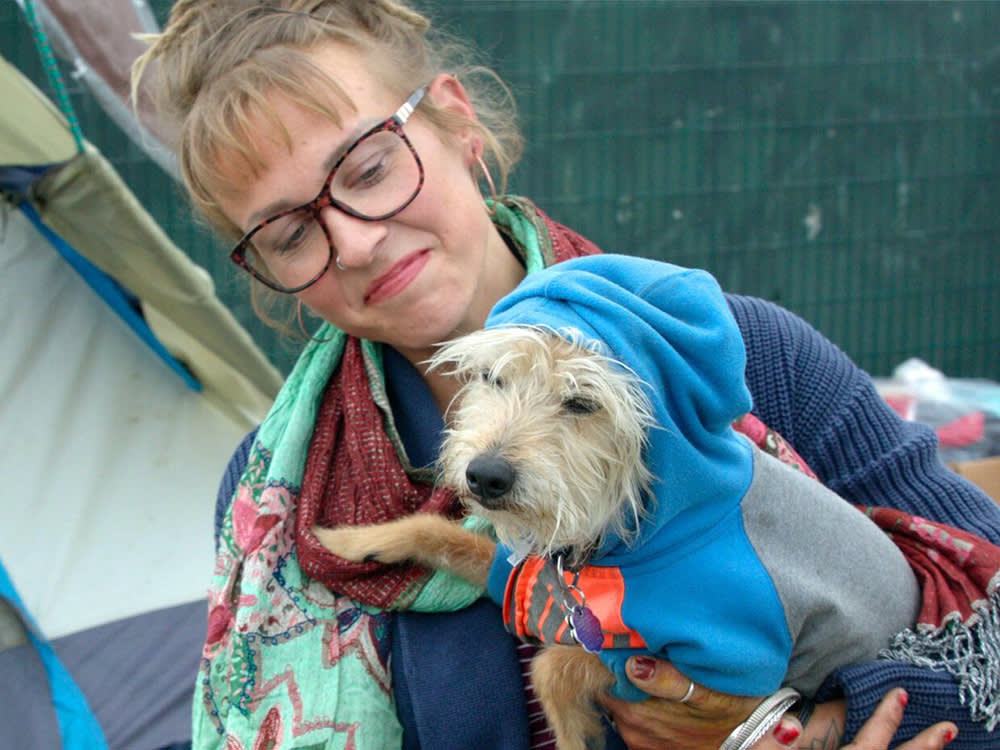Dr. Kwane Hits the Streets to Treat Unhoused People’s Pets
“The Street Vet” on his heroic work and how you can help.
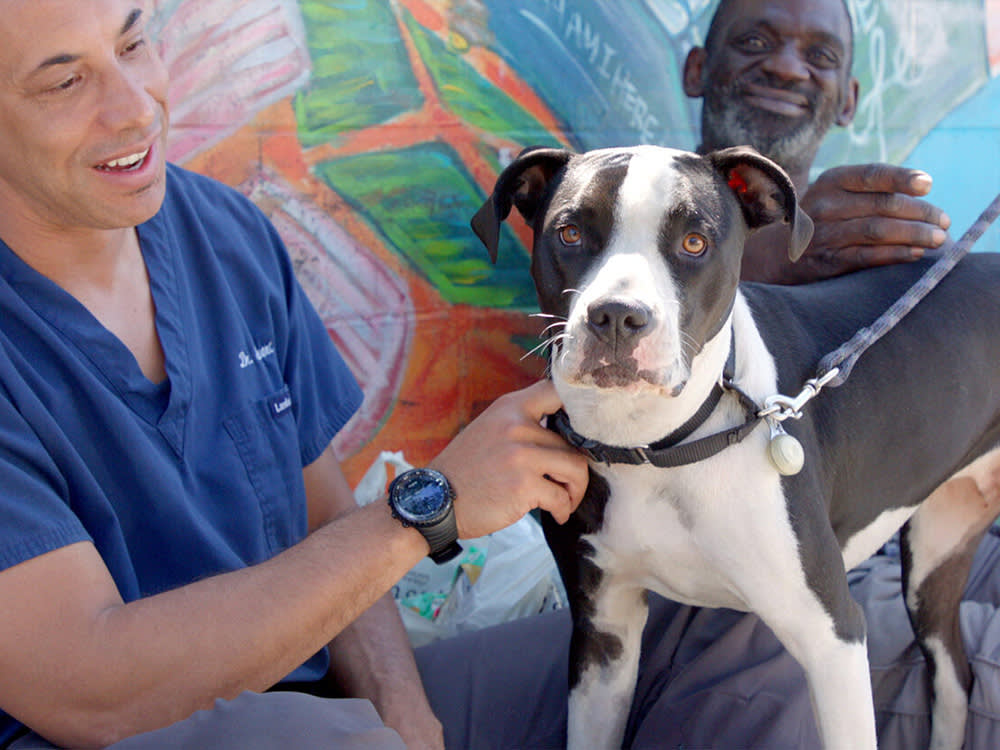
share article

Your pet wants you to read our newsletter. (Then give them a treat.)
In the world of animal rescue, Dr. Kwane Stewartopens in a new tab is a bona-fide unicorn. For roughly a decade, the San Diego-based veterinarian, better known as The Street Vetopens in a new tab, has been treating the pets of unhoused people throughout the state of California. (He funds this non-profit outreach with help from an ongoing GoFundMeopens in a new tab.) Recently, he’s even started advising volunteer vets in other states.
His unwavering kindness is particularly powerful when you watch him in actionopens in a new tab. (TW: Prepare to cry. A lot.) As much as he’s a plain-spoken guy simply doing good work, he’s also a persistent advocate of “seeing” unhoused people. In doing so, Stewart has steadily transformed public perceptions of people experiencing homelessness while bolstering their well-beings by helping protect their trusted companions. We caught up with the very busy, but very friendly Stewart to discuss how he became The Street Vet, what his work entails on a day-to-day basis, and what we can do to help.
A lot of people are scared of people experiencing homelessness. Truthfully, when you first started doing this, did you have concerns?
It crossed my mind. There is this long-held belief they’re all drug addicts and crazy or schizophrenic. It’s just not true. Yes, you do see that on the streets. But the thing is, people who own pets, for the most part, have it together because they have to care for another creature day after day. Most of the people that I encounter, they may have some hidden substance-abuse issue, but when I meet them, they are lucid, friendly, and talkative. There’s this exchange of emotion and gratitude, for both of us.
I would imagine because so many people are now living on the streets that you’ve suddenly come in high demand.
Yeah, a lot of customers. You know, the estimates say that about one in five who are unhoused own a pet. And you have hundreds and hundreds of more people living in their cars or on the street.
How do you survive, yourself, financially? Do you have a job?
I started doing some work in Hollywood; I was the National Director for “No Animals Were Harmedopens in a new tab.” It’s a 78-year legacy program that protects animals on film sets. For seven years, I ran that program. And I was working for a new veterinary startup until just a few weeks ago. But it just became too much: This charity is taking off like it never has before. It doesn’t pay me. I volunteer all my time. But what it does is kicks open other doors and opportunities: I have sponsors that want to pay me to be a spokesperson or an ambassador for their company. So there’s a way for me to stay afloat financially.
What was the tipping point that inspired you to do this full-time?
I worked at a shelter from 2007 to 2012. It was a terrible time to be a shelter. I was doing it in [Modesto] California, which was ground zero for the recession. There was already high crime and high unemployment. When people suffer, their animals suffer. Dogs and cats were being dropped off daily. A lot of them were irredeemable or could be adopted [and weren’t]. My team and I were euthanizing 40, 50, 60 animals by 10 am. It just starts to destroy your soul after a while. This was never what I dreamed of doing when I was a child wanting to get into this profession. There was this week I just said, “I can’t go to work.” I couldn’t get out of bed. I couldn’t do it.
What changed?
I was coming out of a 7-Eleven, and I passed the same unhoused man that I had five or six times before, regrettably, like I used to. But on this day, I noticed his dog had a really bad skin condition. Fleas in dogs in California are very common. Sometimes it gets so bad — this dog looked like a burn victim. He said, “Yes, you know, I’m miserable. She’s miserable. I don’t know what to do.” It was flea treatment, three dollars out of my pocket. Ten days later the dog was transformed, wagging his tail. The man, sitting in the same spot, looked up, and he was crying and said, “Thank you.” That was the moment. It was hugely rewarding, and I felt like I was getting back to saving animals on my terms.
What impact has this had on your mental health?
At the time, it saved me. I was isolating myself and cutting people off in my life. My mom would call, for example, and I wouldn’t return her call for days. I was slowly pulling away, and this brought me back. That’s why I keep doing it.
What are the positive mental-health impact that you see after you help unhoused people?
There was a case on Skid Row. He had been on drugs for a long time. And he rescued this dog, which became his best friend. You saw this: “This dog gives me purpose. It’s what keeps me straight. I have something relying on me.” When they start to feel disconnected from society, it’s easy to start slipping more and more. He said, “You know, you’re doing this work, and it makes me believe there’s hope for people.”
We’ve been talking about dogs, but do you ever treat cats on the street?
My anecdotal breakdown is about one out of every 20 I see has a cat. And the cats are amazing to me. These cats know their way around the block and come back home. And some of them, it’s almost like they’ve gone through some sort of obedience training. They’re just very well socialized.
Have you encountered any unusual animals?
I saw a python. I know about reptiles because I had a python in college. One of my favorite ones was Barbara with her two cockatoos; she had been on the streets for 12 years. Couple of rats, I’ve seen. Yes, real rats as pets on the streets. Just running around.
So, what can the average person do to help?
Just follow your gut, short of ignoring the unhoused. That is probably the first barrier that people need to cross. If you see a person with a pet, and your intention is to help, go up and treat them like a human being. Say “hi” and ask them what the dog needs. It’s really that simple. Some people don’t want to give money, so I’ve told people in the past, “Maybe maybe you can sponsor that pet at your vet hospital. You could speak to your veterinarian and say, ‘I’d like to cover some or all of the medical costs for this dog.’” And most vets are completely down.
Donate to Project Street Vet HEREopens in a new tab.

Nisha Gopalan
Nisha Gopalan has been a writer/editor for The New York Times, New York magazine, Entertainment Weekly, Variety, The Hollywood Reporter, and NYLON magazines. She currently resides in Los Angeles.
Related articles
![A woman sitting on a couch with three dogs.]() opens in a new tab
opens in a new tabVictoria Lily Shaffer Wrote the Book on Dog Rescue
How the author and founder of Pup Culture Rescue is fusing her experience in the entertainment industry with her passion for animal advocacy.
![Black woman smiling and holding a Siamese cat which is looking into the camera]() opens in a new tab
opens in a new tabCARE Is Amplifying BIPOC Voices to Keep People and Pets Together
“We don’t consider what we are doing animal welfare work. We are taking a holistic approach to well-being for animals and humans.”
![Zach Skow posing with a dog and a skateboard.]() opens in a new tab
opens in a new tabZach Skow’s Dogs Saved His Life. Now He’s Returning the Favor
The founder of Marley’s Mutts and the Pawsitive Change Program on fighting for the underdog, creating hope for people and pets, and rescuing animals from California to Kabul.
![Sterling "Trapking" feeding a treat to an orange rescue cat]() opens in a new tab
opens in a new tabSterling “TrapKing” Davis is Going Global
The rapper-turned-trapper quit his music career to start a cat rescue, has saved the lives of thousands of strays, and is promoting diversity in the animal welfare world. This spring, he’s taking things international.
